- Home
- John Jakes
The Bastard: The Kent Family Chronicles Page 25
The Bastard: The Kent Family Chronicles Read online
Page 25
Alarmed, Phillipe thought of the talk he’d heard about highwaymen in London. Captured ones were summarily hanged from Tyburn Tree. But that didn’t seem to discourage extensive practice of the profession. They were a desperate lot.
Phillipe turned around again. The rider on the bay was galloping to keep pace with the speeding coach. His hand came up. Suddenly an explosion split the morning air, louder than the thunder of the wheels.
From beech thickets flanking the post road just ahead, two other horsemen appeared, spurring to the road’s center to block passage of the coach. Now it was no longer a question of outrunning a single rider.
The one behind had fired the warning shot. Both men ahead rode expertly, without gripping the reins. Between them they held four long-barreled pistols.
The coach guard flung the blunderbuss to his shoulder, then let it drop—because the driver was already kicking at the brake and hauling on the traces, unwilling to press his luck against a trio.
Phillipe’s eyes riveted on the rider who had come out from the left side of the road. He sat very tall in his saddle, the silver side plates and butt caps on his pistols flashing in the sunlight. Even through the billowing dust, Phillipe could see that the highwayman wore a leather patch over one eye, jackboots and a dirty coat that had once been bright orange.
iii
Shrill questions and cries of alarm rose from inside the coach as it swayed to a halt. The guard leaned over the side and yelled:
“Keep still and hand ’em all your valuables and we’ll get off safe—if we’re lucky.”
Phillipe’s scalp crawled with sweat. Perched in the open, he was quite aware that the one-eyed man had spotted him. As the coach settled to rest, the two highwaymen trotted their horses toward it, joined by their companion from behind. He sprang from his saddle, jerked open the left-hand door.
Phillipe sat utterly still. He knew this meeting was not accidental. Perhaps there had been watchers at every coaching inn of importance. His palms grew as sweaty as his forehead. He realized once again the depths of Roger Amberly’s animosity.
The one-eyed man gave the driver an empty smile and a salute with one pistol. At close range, the pock marks on his ravaged cheeks stood out clearly.
“Captain Plummer, sir, at your service. We’ll trouble your passengers for whatever trinkets they may have. Then you shall be on your way again.”
“Everyone out,” ordered the scrawny man at the coach door, stowing both of his pistols in his belt. The four barrels of the two others still menaced driver, guard and passengers—sufficient firepower to guarantee success of the enterprise.
The family alighted first, the mother comforting her frightened little daughter. Next came the outraged fat man, then the other parson. Of Marie there was no immediate sign.
But Phillipe was more concerned with Captain Plummer. He brought his horse near the coach and once again smiled his false smile:
“If each one of you ladies and gentlemen obey the orders of my coves in good fashion, we shall have no unhappy accidents.” His one glaring eye slid to Phillipe—and the smile froze in place. Phillipe knew full well what was going to happen. At least one “unhappy accident.”
When Captain Plummer saw that understanding register on Phillipe’s face, his smile became genuine. He wagged a pistol.
“If the passengers on the roof will also alight, please—?”
As the parson began to descend via the wheel spokes, the scrawny man said, “There’s one left inside, cap’n. A woman.”
Plummer nodded. “Yes, I wondered about that.”
Phillipe’s cheeks felt fiery. Under his sweated clothes, his heart hammered hard. He knew he had no chance to unwrap Gil’s sword. Nor did he have any other weapon at his disposal. But unless he defended himself, he would die, the quickly forgotten victim of yet another highway incident.
Lucas’ shiny face looked ferocious as he climbed down. A possible ally there, Phillipe thought, dropping into the dust behind the blackamoor.
“Assist our reluctant passenger,” Captain Plummer ordered his scrawny helper.
The man dropped a sack he’d pulled down from his saddle, reached inside the coach toward Marie. For one moment, his body and outstretched right arm blocked the line of sight between Phillipe and Captain Plummer. Phillipe chose the moment because it might be his last chance. He struck for the scrawny man’s exposed middle with both fists.
iv
The scrawny man doubled forward, uttering a furious curse. He clawed for the second, undischarged pistol in his belt. Phillipe heard the mother of the little girl shriek—and something else: the sudden clopping of Captain Plummer’s horse as the one-eyed man positioned himself to shoot.
Phillipe whirled the dazed man by the shoulders. Captain Plummer’s right-hand pistol boomed with a flash and a puff of smoke. Blood splattered Phillipe’s cheeks as Plummer’s close-range ball blew a hole in the scrawny man’s neck.
The man let out a kind of choking sigh, sagging in Phillipe’s arms, no longer a shield.
Phillipe released the dead man, leaped away as the passengers yelled and scattered. Plummer roweled his nervous horse viciously to hold him still, pointed his second pistol at Phillipe’s head.
A clear target against the side of the coach, Phillipe had no place to run. The dark eye of the pistol muzzle followed him as he threw himself on the ground.
Captain Plummer was a professional. He would not be rushed into the shot for which he had undoubtedly been well compensated. Hitting the dust, Phillipe awaited the explosion, the thud of a ball into his flesh—
But it didn’t come. The blunderbuss roared.
Captain Plummer began to swear; his oaths punctuated by groans of effort. Phillipe rolled frantically underneath the coach and out the other side. Just ahead of the horses, the third highwayman toppled from his saddle. A wound in his groin bubbled red.
That man had been the target of the blunderbuss, then. Phillipe ran toward him. Over the lathered backs of the horses he saw what had saved him. The blackamoor had fastened both hands on Captain Plummer’s left arm and was holding on ferociously, even as Plummer tried to haul back in the saddle and transfer his still-loaded pistol to his right hand.
But the immense Lucas kept levering the highwayman’s left arm down and back. Plummer’s mouth worked in obscene rage, spittle on his lips, sweat on his pocked cheeks. With his right hand he hit for Lucas’s eyes, to claw them out if he could. Lucas snapped his head back, laughed a big booming laugh that died abruptly as Plummer managed to gouge a thumb into his eyesocket.
Lucas’s hold on the highwayman’s left arm loosened. Plummer wrenched free and aimed at the nearest target—the black by his stirrup.
Phillipe had reached the fallen man, who was moaning in pain. He snatched up one of the man’s pistols. He fired past the bobbing muzzles of the lead coach horses.
With a scream, Captain Plummer arched his back. Phillipe had aimed for the best and biggest target—the man’s torso. There, over the left ribs, the shabby orange coat showed an immense black-edged hole from which blood poured.
Lucas pried the pistol out of Plummer’s relaxed hand, drew back the cock and fired point blank.
Captain Plummer’s leather eyepatch disappeared in a torrent of blood. The sight brought fresh screams and hysterical sobs from the mother and her small girl. The big blackamoor hit Plummer’s horse on the flank and sent it bolting toward the trees. The sudden motion flung the highwayman’s corpse into the roadside ditch, mercifully hiding the ruin of his head.
Wiping sweat and dust from his cheeks, the blackamoor grinned across the backs of the horses.
“A keen shot, sar.”
Phillips waved weakly, dropped the hot pistol in the dirt. He heard the driver and the guard calling thanks and congratulations. With surprising lack of Christian concern for the dead thieves, even the parsons expressed delight at the outcome.
Phillipe walked back to the right-hand coach door, opened it to look at his
mother. He started to speak, couldn’t.
Marie huddled in the corner. Her fingers tapped nervously at the old leather of the casket. Her lips moved but produced no sound. Her eyes stared far beyond the wall of the coach. If she’d heard the pistol shots and the screaming, she gave no sign.
Phillipe spoke his mother’s name. Silence.
Slowly he closed the coach door and stumbled to the roadside ditch. There he bent over, violently sick.
v
Presently the journey resumed, Phillipe back in place on the roof with his equally bedraggled companions.
Lucas hummed, striking his palm in rhythm against the sateen of his knee as the coach flashed under low-hanging branches that dappled Phillipe’s vision with flickering shadows.
He’d tried to rouse Marie once more before the coach got under way. He had managed to produce a murmur that might have indicated she recognized him. But that was all.
In a way he was glad that she had missed the entire encounter. But her condition continued to frighten him.
He felt totally alone. Only he knew the true reason Captain Plummer and his henchmen had selected this particular coach for plundering. Plummer had planned to earn a double reward. His loot from the passengers, and whatever sum he’d been paid by Phillipe’s halfbrother.
Phillipe tried to imagine the damage the fight with the silver-headed stick had worked on the young nobleman’s hand. It must have been considerable to provoke such retribution. Of course—Phillipe was already familiar with this bitter lesson—Roger would have undertaken his scheme with few fears of paying any penalty. Phillipe only hoped there would be no further pursuit before he was able to secure their passage out of Bristol.
But there was no one to whom he could communicate his anxieties now. Not the driver, whose attitude had become overwhelmingly cordial; not the parsons; no one. His secrets, and his hatred, were prisoned inside, where their heat had begun to forge a new Phillipe Charboneau out of the one who had so naively crossed the Channel only a year ago.
As the coach jounced along, he realized he was nearing his nineteenth birthday. He’d lived nearly half a man’s normal life span already. In Auvergne, he had known virtually nothing of the world. But in the last twelve months he had learned enough to more than make up. He only hoped he could put the experience to some use.
It troubled him deeply that he had now been responsible for the deaths of three human beings—four if he counted the scrawny fellow he’d thrust into the path of Captain Plummer’s ball.
True, none of the killings was deliberate. All had been done in self-defense. And his success in each case was, in fact, the source of an odd, guilty pride.
Still, none of the deaths, not even Plummer’s, rested easy on him. As he clung to the roof rails, beginning to ache from all the bounces and jolts, he hoped to God he would never entirely lose that sense of life’s value.
If he ever did, he would then have become exactly like Roger Amberly.
vi
Finally, about an hour after the incident with Captain Plummer and his men, Phillipe shook off the horror of the attack and turned his mind to more practical things.
A ship out of Bristol offered not only sanctuary but hope and opportunity. So the ledger was not entirely without its credits. He recalled the money Franklin had advanced and searched for the purse to make certain he hadn’t lost it in his scrambling. He hadn’t.
But the pouch containing the list of printing houses and the letter of introduction was gone from his belt.
Urgently, he bent forward to the driver’s shoulder. “Sir—back along the road when we stopped, I lost papers I was carrying.”
“Sorry, lad,” the man shouted. “Can’t turn around. Can’t stop except to change horses—I’m fined if we don’t keep schedule. Even when the cause is a captain of the road.”
“But the papers are valuable. I need them where I’m going.”
“Then ye’ll have to take another coach back, and try to get off and search,” was the answer. An impossible answer, Phillipe knew. Funds were short enough as it was. And he felt he dared not leave Marie alone now that her health had taken such a strange, precarious turn.
He regretted his own stupidity in not taking the time to so much as glance at Franklin’s list. Even a few remembered names might have been of assistance when—and if—they reached America. Establishing connections in a new city would be just that much more difficult now.
He smiled a small, bitter smile. Even in failure, Roger Amberly’s agents had dealt a blow to his prospects.
But he reminded himself that he was no longer Phillipe Charboneau of Auvergne. He had become someone different; harder, perhaps.
And so he thought, God damn them all. I will survive.
vii
The Bristol coach stopped the night at a restful country inn. When Phillipe opened the door to help his mother alight, he was thankful that she seemed aware of her immediate surroundings, and his identity again.
Earlier, when the driver had halted a few minutes at a way station for fresh horses, Phillipe had circulated quietly among the passengers. At that time Marie was still sitting immobile inside. He told the passengers that due to recent strains, his mother was not herself. He suggested there was no point in alarming her later with references to the attack by Captain Plummer. Since Phillipe and the blackamoor had assumed the temporary stature of heroes, thanks to boldness and lucky shooting, the others readily agreed.
Even the portly and somewhat pompous man whom Lucas served grew more friendly. He invited Phillipe to share his table at the inn that evening.
The portly gentleman was named Hoskins. He lived in Bristol. He was quick to point out that he did not own Lucas outright, as a slave—as was the custom in some of the colonies. The blackamoor was a free member of the serving class.
“So he can join us, too,” Phillipe said as the guard tooted his horn to signal that the coach was ready to get under way.
“Oh, no!” Hoskins returned, horrified. “He’s still required to eat in the kitchen.”
Climbing up the wheel, Phillipe recalled the Irishman Burke’s remark about Dr. Franklin having organized a colonial society to oppose the institution of slavery. But he couldn’t recall any mention of slavery in the numerous books and pamphlets he’d devoured. Perhaps the references had been there and had slipped by him; or perhaps the propagandists of the colonies preferred to gloss over the subject. At any rate, the reminder that a market for human beings existed in America tainted Franklin’s glowing comments somewhat.
At their overnight stop, Phillipe and Marie sat opposite Hoskins. After a filling meal, of which Marie ate little, the traveling family retired for the night. The parsons withdrew to a private table, presumably to discuss rarefied theological subjects. The coach driver and the guard had eaten their suppers on benches near the cheerful fire. They were already drunk and busy poking and fingering the rump of the inn’s cowlike serving girl.
“Have you and your mother any connections in Bristol?” Hoskins asked eventually.
“No, sir, none.” Phillipe glanced at his mother. The fire lit her dark eyes with pinpoints of brilliance, threw patterns of scarlet and shadow on her cheeks. She stared at her mug of ale that had been heated with a poker. She’d managed a few yes and no answers during dinner conversation, but nothing more. Phillipe was terrified in the face of such continuing silent despair.
With effort, he amplified his short answer to Hoskins:
“We’re anxious to find a ship for America, though.”
Hoskins drank. He was already working on his third or fourth mug. “Oh, then you’ve connections in the colonies.”
Again Phillipe shook his head. “We intend to sail to one of the colonial ports, where I mean to look for work as a printer.”
“Which port’s your destination?”
“We’ll go wherever the first ship goes, probably. Do you know how much it costs for passage, sir? I have five pounds.”
Hoskins drank mo
re ale. “Not nearly enough. However—” He belched, wiped his blubbery lips with his sleeve. “Since you defended us so handsomely today, and I take you for a person of good, if humble character, I may confide a secret. I’m carrying a deal of money. Yes, a deal,” he emphasized with puffed-up pride, fingering the thickness under his waistcoat. Phillipe had assumed it to be natural fat, not concealed wealth.
“ ’M a manufacturer of ironware. Hoskins’ kettles and pisspots are the byword in the finest dining places and hostelries in London. Used in many of the very best whorehouses, too—oh. Your pardon, madame. Now I just sold a handsome lot of merchandise this trip. But I also ship to the colonies. Oh, yes, in quantity. And while I’m a loyal Tory—a supporter of His Majesty—I also prefer to see relations with America prosper at any cost. Any cost short of rebellion, that is. I’m glad the King’s ministers repealed some of those damned taxes. Might have been necessary, those taxes. But ruinous for trade—ruinous! Urged their repeal myself. Joined with many other important merchants and factory owners. Put the screws on that fat German—”
Hoskins belched even more loudly. Phillipe realized the overweight gentleman was tipsy.
“Beg pardon, His Majesty. Where was I? Oh yes. Colonial trade. Well. In Bristol, one of my first tasks is to immediately hie myself to the wharfs and see what American vessels are in port. For with this—”
Another thump of what had to be a money belt concealed under his clothing.
“—I can finance quite a shipment of Hoskins’ finest to our American cousins. Yes. Quite a shipment.” Belch.
Phillipe sat silent, letting the fat man ramble on.
“Here’s the point, young fellow. I have wide acquaintance with the sailing masters who call at Bristol from Philadelphia, New York City and that blasphemous hotbed of treason—” A double belch; a prodigious yawn. “—Boston. So if you care to follow me during my calls on the captains, perhaps I can use my influence to find you a working berth. Only alternative is to sell yourself to the captain for seven years, then hope he can re-sell your indenture contract to some decent gentleman on the other side. Let me see—” A noisy fart “—Madame, beg pardon. Let me see if I can help you get around that unpleasant prospect. I do have influence. I ship large orders. Large! You saved me a deal of money. Grateful. Glad to swing my weight with the captains as best I can. They lose ship’s boys all the time, they do. Boys squander their pay on wagers in the cock pits. Dally with whor—prostitutes. Lie drunk when their vessels sail. Shouldn’t be hard. Not with a tot of luck. And Hoskins. All the captains know Hoskins. Successful merchant prince. Finest ironware—”

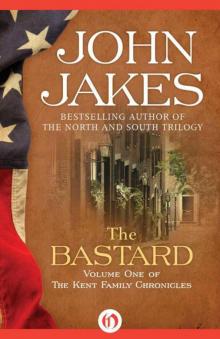 The Bastard
The Bastard The Furies
The Furies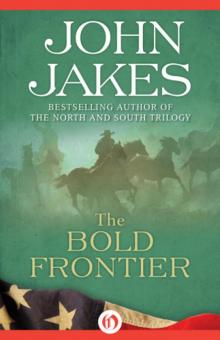 The Bold Frontier
The Bold Frontier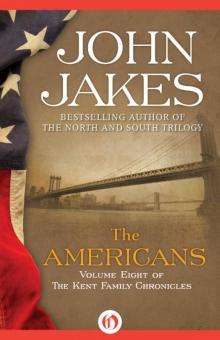 The Americans
The Americans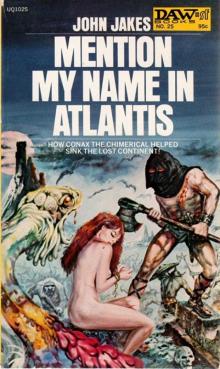 Mention My Name in Atlantis
Mention My Name in Atlantis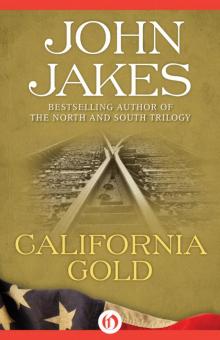 California Gold
California Gold North and South
North and South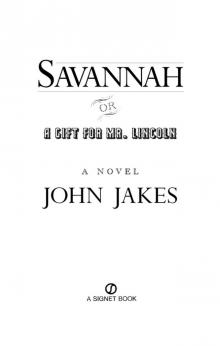 Savannah, or a Gift for Mr. Lincoln
Savannah, or a Gift for Mr. Lincoln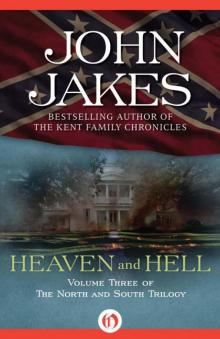 Heaven and Hell
Heaven and Hell Homeland
Homeland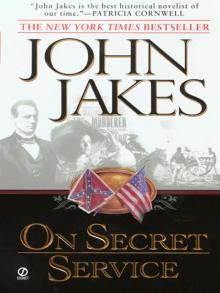 On Secret Service
On Secret Service The Lawless
The Lawless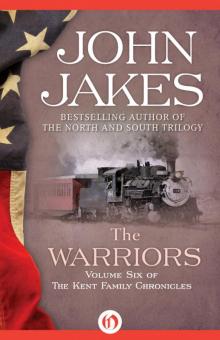 The Titans
The Titans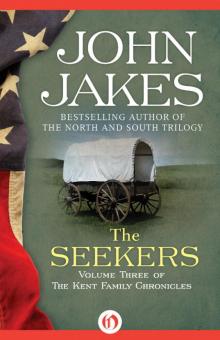 The Seekers
The Seekers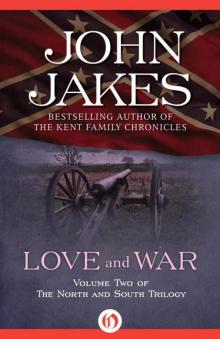 Love and War
Love and War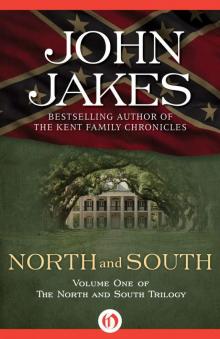 North and South: The North and South Trilogy (Book One)
North and South: The North and South Trilogy (Book One)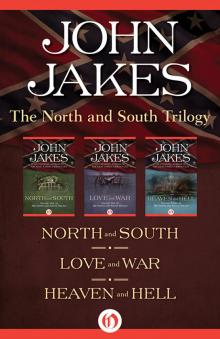 North and South Trilogy
North and South Trilogy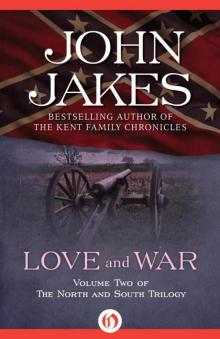 Love and War: The North and South Trilogy
Love and War: The North and South Trilogy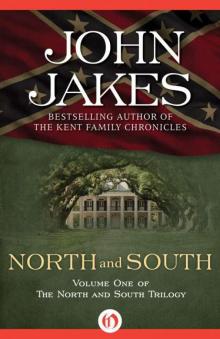 North and South: The North and South Trilogy
North and South: The North and South Trilogy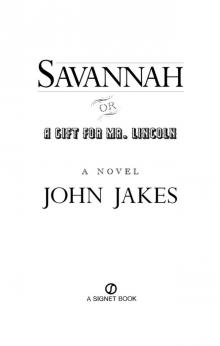 Savannah
Savannah Lawless
Lawless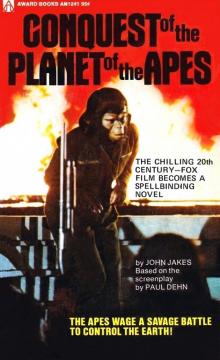 Conquest Of The Planet Of The Apes
Conquest Of The Planet Of The Apes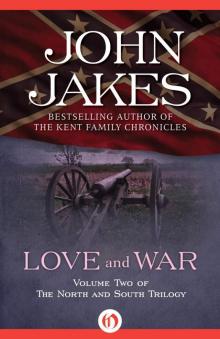 Love and War: The North and South Trilogy (Book Two)
Love and War: The North and South Trilogy (Book Two)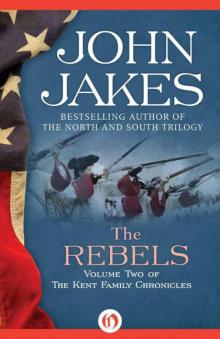 The Rebels: The Kent Family Chronicles
The Rebels: The Kent Family Chronicles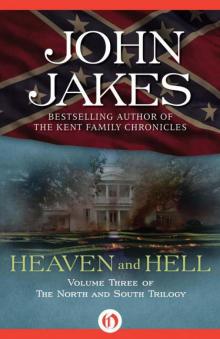 Heaven and Hell: The North and South Trilogy
Heaven and Hell: The North and South Trilogy Planet of the Apes Omnibus 2
Planet of the Apes Omnibus 2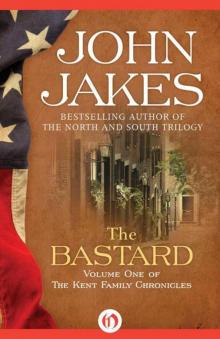 The Bastard: The Kent Family Chronicles
The Bastard: The Kent Family Chronicles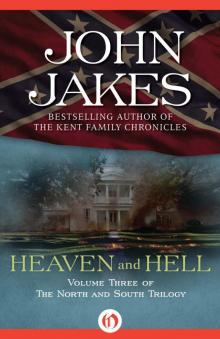 Heaven and Hell: The North and South Trilogy (Book Three)
Heaven and Hell: The North and South Trilogy (Book Three)